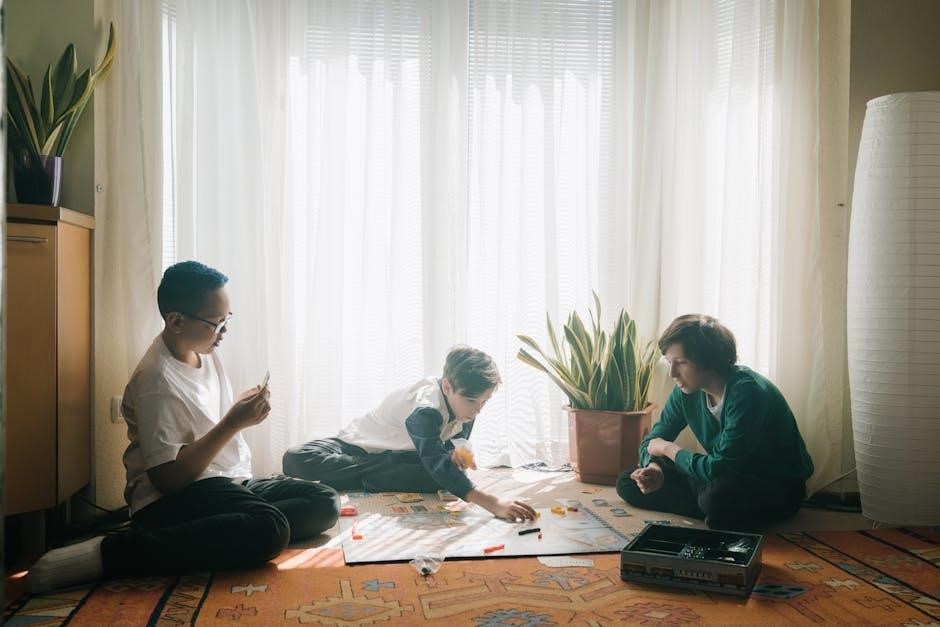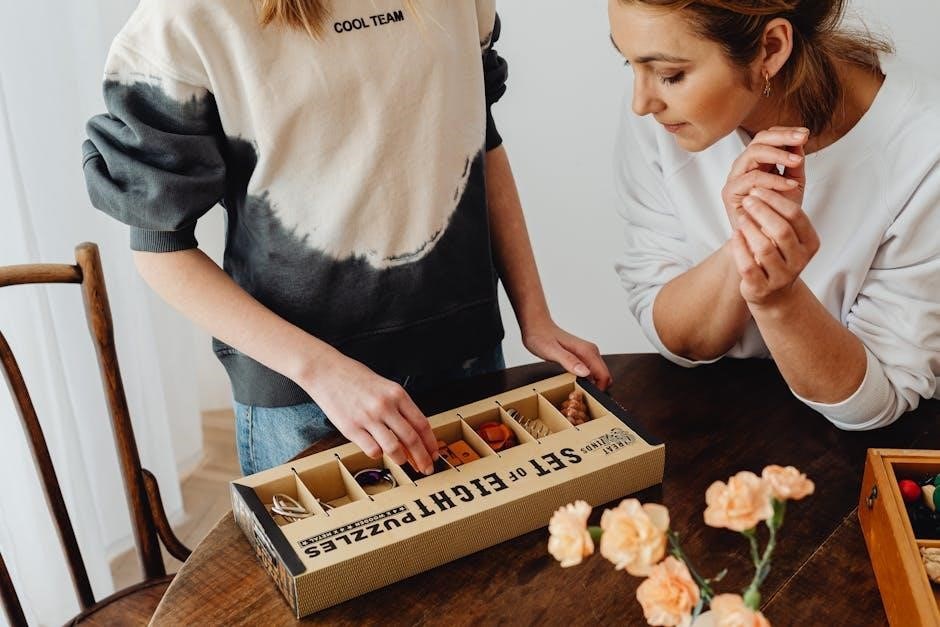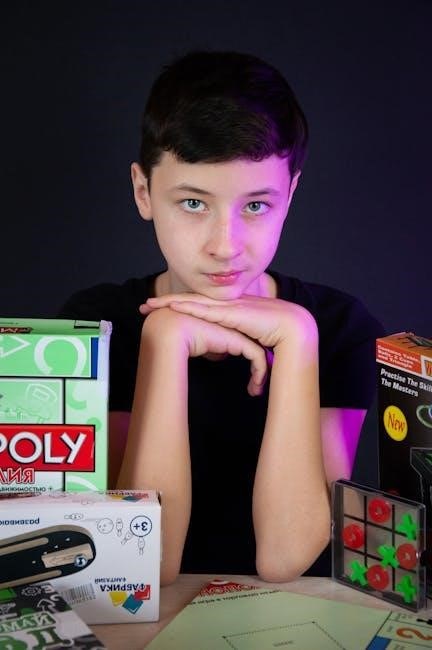Social Scenario Problem Solving Task Cards are interactive tools designed to help students navigate real-life situations, fostering critical thinking and social-emotional growth through guided discussions.
What Are Social Scenario Problem Solving Task Cards?
Social Scenario Problem Solving Task Cards are resources designed to help students practice navigating real-life situations through guided discussions and problem-solving activities. These cards present various social scenarios, such as interactions with peers, family, or classroom situations, and ask students to brainstorm solutions or responses. They are often used in educational settings to promote social-emotional learning (SEL) and critical thinking. Available in printable formats, these task cards are adaptable for different age groups, from elementary to high school students. Many sets are color-coded by category, making them easy to organize and implement in classrooms or at home. They serve as practical tools for teaching essential life skills and fostering emotional intelligence.
The Importance of Social Scenarios in Education
Social scenarios play a crucial role in education by preparing students to navigate real-life interactions and challenges effectively. These scenarios help students develop essential skills like communication, empathy, and conflict resolution, which are vital for building strong relationships. By exposing students to diverse social situations, educators can foster emotional intelligence and reduce anxiety in unfamiliar or stressful interactions. Social scenarios also encourage active thinking and problem-solving, enabling students to approach challenges with confidence. Incorporating these scenarios into lesson plans makes learning interactive and engaging, ensuring students are well-equipped to handle social dynamics both in and out of the classroom. This approach creates a supportive environment for students to grow socially and emotionally, setting them up for long-term success.
Key Features of Social Scenario Task Cards
Social Scenario Task Cards are designed to be interactive and engaging, offering students real-life situations to discuss and solve. They often include diverse scenarios, such as interactions with peers, family, or classroom dynamics, making them relatable. These cards are adaptable for various age groups, from elementary to high school students, ensuring relevance. Many task cards are color-coded by category for easy organization. They align with Social Emotional Learning (SEL) competencies, focusing on skills like communication and empathy. Additionally, they are versatile, suitable for classrooms, small groups, or home use. Their portability and ease of use make them a practical tool for educators and parents aiming to foster social and emotional growth in students.

Benefits of Using Social Scenario Problem Solving Task Cards
Enhances social-emotional learning, improves problem-solving abilities, and fosters critical thinking, preparing students to navigate real-life challenges with confidence and empathy.
Improving Social Skills in Students
Social Scenario Problem Solving Task Cards are an excellent tool for enhancing students’ social skills by presenting real-life situations for discussion and resolution. These cards encourage students to think critically about how to interact appropriately with peers, family, and others in various contexts. By exploring scenarios related to sharing, cooperation, and conflict resolution, students develop essential communication and empathy skills. The task cards also help students with special needs, such as autism or ADHD, by providing structured opportunities to practice social interactions. Regular use of these cards fosters confidence, teamwork, and the ability to navigate complex social dynamics, preparing students for lifelong interpersonal success.
Enhancing Problem-Solving Abilities
Social Scenario Problem Solving Task Cards are designed to enhance students’ problem-solving abilities by presenting real-life situations that require critical thinking and effective decision-making. These cards encourage students to analyze scenarios, brainstorm solutions, and evaluate the potential outcomes of their actions. By engaging with these tasks, students develop essential skills such as identifying problems, considering multiple perspectives, and selecting the most appropriate response. The structured format of the cards guides students through the problem-solving process, helping them build confidence in their ability to navigate challenges. Regular practice with these cards fosters resilience and teaches students to approach conflicts and misunderstandings with a proactive and thoughtful mindset, preparing them for success in various social and academic settings.
Promoting Emotional Intelligence and SEL
Social Scenario Problem Solving Task Cards are a powerful tool for fostering emotional intelligence and social-emotional learning (SEL). By engaging students in discussions about real-life situations, these cards help them develop essential competencies such as self-awareness, self-management, and relationship skills. Students learn to recognize and manage emotions, empathize with others, and navigate complex social dynamics. The task cards encourage reflective thinking, allowing students to consider multiple perspectives and practice positive communication. This structured approach to SEL helps students build stronger relationships, resolve conflicts effectively, and develop a deeper understanding of their own emotions and those of others. These skills are critical for fostering a supportive and inclusive learning environment.

How to Use Social Scenario Problem Solving Task Cards
Social Scenario Task Cards can be used in classrooms or at home to encourage discussions and problem-solving. They provide structured opportunities for students to explore and practice social skills in a supportive environment, fostering critical thinking and collaboration.
Implementing Task Cards in the Classroom
Social Scenario Problem Solving Task Cards are versatile tools that can be seamlessly integrated into classroom routines. Teachers can use them during group discussions, small group work, or as whole-class activities. Each card presents a real-life situation, prompting students to think critically and collaborate on solutions. They can be displayed on charts, printed as handouts, or digitized for online learning. Teachers can model problem-solving steps, encouraging students to articulate their thoughts and consider multiple perspectives. These cards also align with SEL and PBIS frameworks, reinforcing social-emotional learning and positive behavior. Regular use fosters empathy, conflict resolution, and effective communication, preparing students to navigate social challenges with confidence and resilience.
Using Task Cards at Home
Social Scenario Problem Solving Task Cards are a valuable resource for parents and caregivers to support children’s social-emotional development at home. Families can use these cards during meals, before bed, or as part of homework routines to foster meaningful conversations. Parents can read the scenarios aloud and encourage children to share their thoughts and solutions. This helps kids practice conflict resolution, empathy, and decision-making in a comfortable setting. The cards are also portable and can be used during car rides or outings, making learning accessible anywhere. By engaging with these tasks, children develop essential life skills while strengthening their ability to navigate real-world situations confidently.

Common Social Scenarios Covered in Task Cards
Task cards address interactions with peers, family, and classroom situations, as well as recess and lunch scenarios, helping students navigate everyday social challenges effectively.
Interactions with Peers
Task cards focusing on peer interactions address common social challenges, such as resolving conflicts, sharing, cooperating, and maintaining conversations. These scenarios help students practice appropriate responses to situations like a classmate feeling left out, dealing with disagreements, or understanding personal boundaries. The cards encourage critical thinking about how to handle peer-related issues respectfully and empathetically. By discussing these scenarios, students develop essential communication skills and learn to navigate friendships and group dynamics confidently; These activities are particularly beneficial for fostering inclusivity and teaching students how to approach social situations thoughtfully. The goal is to equip students with the tools to build positive relationships and manage conflicts effectively in their daily interactions with peers.
Family and Home Interactions
Task cards addressing family and home interactions focus on scenarios involving siblings, parents, and household responsibilities. These cards present situations like resolving arguments, sharing chores, or understanding boundaries within the family. Students are encouraged to brainstorm respectful and constructive ways to communicate their feelings and needs. For example, a card might ask how to handle a sibling taking toys without permission or how to express dissatisfaction with a family rule. These discussions help students develop empathy, conflict resolution skills, and a deeper understanding of family dynamics. By exploring these scenarios, students learn to navigate home interactions with patience, respect, and effective communication, fostering healthier family relationships and emotional well-being.
School and Classroom Situations
School and classroom situations are central themes in social scenario task cards, preparing students to handle common challenges they face daily. These cards present scenarios like dealing with a classmate who is being unkind, managing disagreements during group work, or understanding classroom expectations. Students are prompted to think critically about appropriate responses and solutions. For instance, a card might ask how to react if a peer excludes them during recess or how to handle a teacher’s feedback. These exercises help students build resilience, develop problem-solving strategies, and understand the importance of respect and cooperation in a school setting. By addressing these real-life situations, task cards empower students to navigate their educational environment with confidence and emotional intelligence.

Social Scenario Task Cards for Different Age Groups
These task cards cater to various age groups, offering scenarios tailored to elementary, middle, and high school students, addressing their unique social and emotional challenges effectively.
Task Cards for Elementary School Students
Task cards for elementary school students are designed to address fundamental social skills and scenarios relevant to their daily interactions. These cards often focus on sharing, cooperation, and basic conflict resolution, using simple language and relatable situations. Scenarios might include interactions during recess, classroom behaviors, or family dynamics, helping young students develop essential communication and problem-solving abilities. Many resources are tailored to align with Social Emotional Learning (SEL) frameworks, ensuring students build confidence and positive relationship skills. Visual aids and engaging formats make these tools particularly effective for younger learners, fostering a strong foundation for social competence and emotional intelligence from an early age.
Task Cards for Middle and High School Students
Task cards for middle and high school students are tailored to address the complex social dynamics and challenges faced during adolescence. These cards present realistic scenarios that encourage critical thinking and effective problem-solving. Common topics include navigating peer pressure, resolving conflicts, managing online interactions, and understanding personal boundaries. The language and situations are designed to resonate with older students, promoting deeper reflection and more sophisticated solutions. Many resources align with educational frameworks like SEL and PBIS, reinforcing skills such as empathy, self-awareness, and decision-making. By focusing on relatable and contemporary issues, these task cards help students develop the emotional intelligence and interpersonal skills necessary for success in their personal and academic lives.

Integrating Task Cards with Educational Frameworks
Social scenario task cards seamlessly align with frameworks like SEL and PBIS, enhancing problem-solving skills and fostering emotional intelligence in structured educational settings.

Using Task Cards in Social Emotional Learning (SEL)
Social scenario task cards are valuable tools in Social Emotional Learning (SEL), providing students with real-life situations to practice self-awareness, self-management, and relationship skills. These cards present diverse scenarios, such as peer interactions or emotional conflicts, allowing students to brainstorm solutions and develop empathy. By encouraging group discussions, task cards foster collaboration and understanding of different perspectives. They align with SEL competencies, helping students navigate social challenges confidently. Teachers can integrate these cards into lessons to promote reflection and skill-building, making them a versatile resource for creating a supportive learning environment. This approach ensures students develop essential life skills through interactive and engaging activities.
Aligning Task Cards with PBIS (Positive Behavioral Interventions and Supports)
Social scenario problem-solving task cards seamlessly align with PBIS frameworks by promoting positive behavioral expectations and providing structured opportunities for students to practice appropriate social responses. These cards present real-life situations, such as classroom interactions or peer conflicts, allowing students to apply PBIS principles like respect, responsibility, and empathy. By discussing scenarios, students learn to recognize and internalize expected behaviors, reinforcing PBIS goals. Task cards also encourage problem-solving and self-reflection, helping students navigate challenges in a constructive manner. This integration supports a proactive approach to behavior management, fostering a positive school climate and equipping students with essential life skills. The alignment enhances PBIS implementation by creating engaging, student-centered learning experiences.

Creating Your Own Social Scenario Task Cards
Designing custom task cards involves identifying real-life scenarios, crafting clear instructions, and incorporating visuals to engage students. This personalized approach ensures relevance and effectiveness in teaching social skills.
Steps to Design Effective Task Cards
Designing effective social scenario task cards involves several key steps. First, identify real-life social situations relevant to your students’ experiences. Next, craft clear, concise scenarios that prompt critical thinking and problem-solving. Incorporate visuals or prompts to engage visual learners. Differentiate scenarios by difficulty or age group to meet diverse needs. Ensure each card includes a question or prompt that encourages discussion and reflection. Consider adding SEL competencies or behavioral expectations to align with educational frameworks. Finally, pilot-test the cards with a small group to gather feedback and refine as needed. This process ensures your task cards are engaging, relevant, and effective in teaching social skills.

Case Studies and Success Stories
Classrooms worldwide have successfully implemented social scenario task cards, improving students’ social skills and problem-solving abilities. Educators report positive outcomes, with students demonstrating better conflict resolution and empathy, making these resources highly recommended for fostering social-emotional growth.
Examples of Successful Implementation in Classrooms
Schools have reported significant success using social scenario task cards to enhance students’ social-emotional learning. For instance, a classroom in an elementary school implemented these cards during morning circles, fostering open discussions about peer interactions and conflict resolution. Students demonstrated improved ability to articulate their thoughts and empathize with others. Similarly, a middle school incorporated task cards into their PBIS program, resulting in fewer behavioral incidents and increased student engagement. Teachers noted that the structured scenarios helped students navigate real-life challenges confidently. These examples highlight how task cards can be seamlessly integrated into daily routines, promoting a positive and supportive learning environment while addressing diverse social situations.

Free Resources and Downloads
Explore free social scenario problem solving task cards in PDF format, available for immediate download. These resources offer a variety of social situations for students to practice and learn from.
Where to Find Free Social Scenario Task Cards
Free social scenario problem solving task cards can be found on educational websites like Teachers Pay Teachers, Twinkl, and My Group Guide. These platforms offer downloadable PDFs for various age groups, covering scenarios such as interactions with peers, family situations, and classroom behaviors. Many resources are designed for special needs students, including those with autism or ADHD. Additionally, websites like Pinterest and eBay often feature free task card samples. Search for terms like “free social scenario task cards PDF” or “social problem-solving task cards for kids” to discover more options. These resources are perfect for educators and parents seeking engaging tools to teach social skills and problem-solving abilities.
Social scenario problem solving task cards are invaluable tools in education, fostering essential life skills and empowering students to navigate social challenges with confidence and resilience.
Final Thoughts on the Value of Social Scenario Task Cards
Social scenario problem solving task cards are indispensable tools for fostering essential life skills in students. They provide structured, engaging ways to explore real-life situations, promoting critical thinking, empathy, and effective communication. By addressing diverse social challenges, these cards help students build resilience and confidence. Their versatility allows educators to tailor them to various age groups and learning environments, ensuring relevance and accessibility. Aligning with frameworks like SEL and PBIS, they offer a comprehensive approach to character development. Free resources further enhance their accessibility, making them a valuable asset for classrooms and homes alike. Ultimately, these task cards empower students to navigate social complexities with ease, preparing them for lifelong success.
